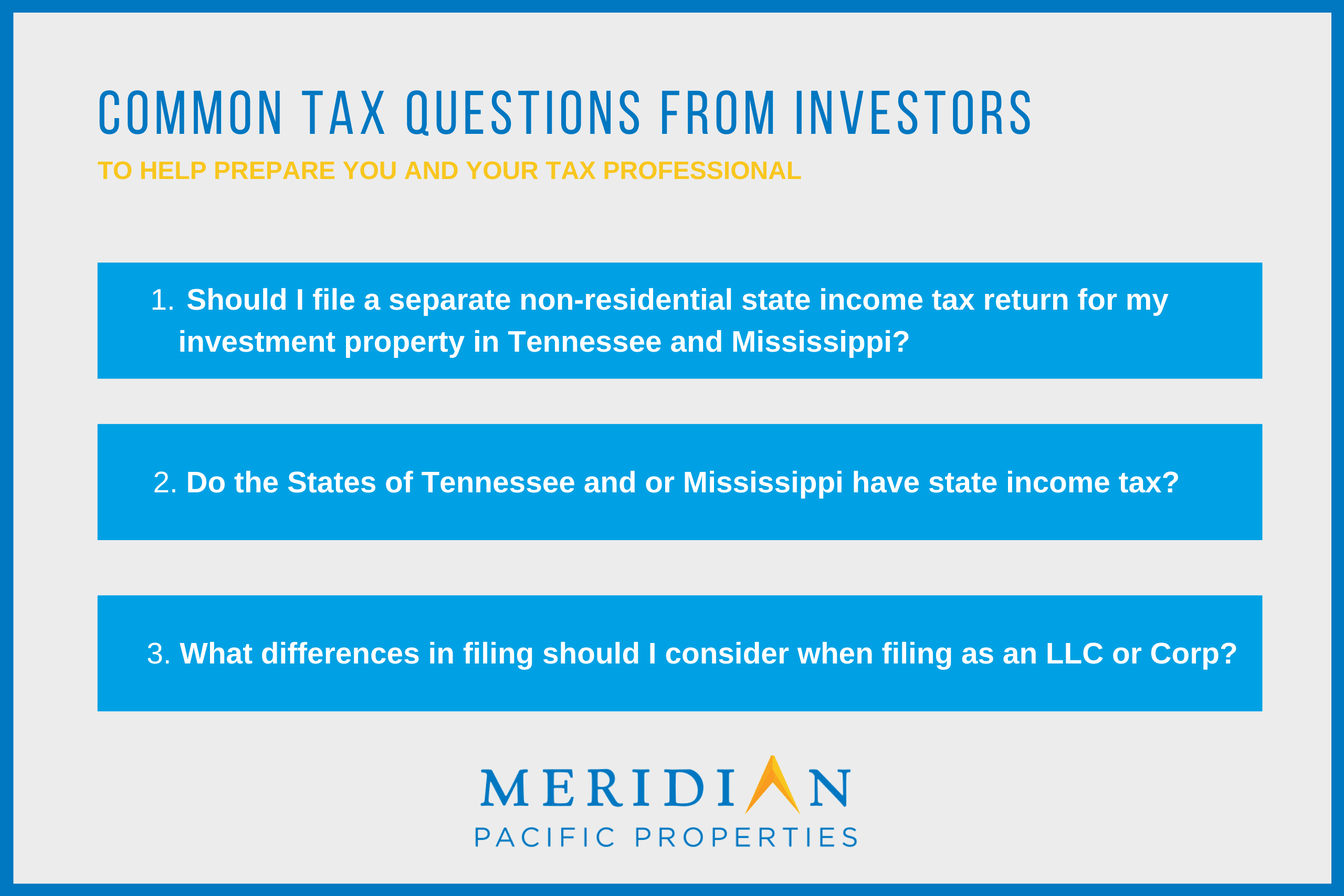Owning an investment property can come with a lot of responsibility. Whether you have one or multiple properties with Meridian Pacific Properties in your portfolio, investors should be well informed and prepared on how to file their taxes. “Do I need to file a separate tax return for my investment property?” “As the country transitions to a new administration, what changes should I consider when filing tax returns on my investment property?” We cover these topics among other important questions and concerns investors may have if you own property in Tennessee or Mississippi.
Please note at Meridian, we are not licensed tax professionals. We do not give our clients specific tax advice. However, we are also investors and want to ensure you are aware of any issues or complications to consider on tax reporting, such as the nature of depreciation, interest deductions, and which states have a state income tax. Use this guide when you meet with your tax professional so that they can help you make informed decisions.
Should I File Non-Resident State Income Tax Returns on My Investment Property?
For Tennessee properties: For Residential Investment Properties (RIP) owners who have investment property titled in their personal name and live in California, or any state other than Tennessee, there is no requirement to file a Tennessee State tax return. The state of Tennessee does not have a state personal income tax, therefore an individual who owns a RIP in Tennessee is not required to file. However, someone holding the property within an SMLLC or Corporation may need to file a Tennessee tax return, as they may need to pay Tennessee franchise and excise (F&E) tax. Payment of Tennessee F&E tax depends on whether certain liability elections were made for their LLC and whether they wish to apply for what is known as an obligated member exemption. Investors holding title in an LLC should discuss their options with their CPA.
For Mississippi Properties: In Mississippi, there is a progressive State Income tax from 3 to 5 percent with taxable income over $10,000 reaching the max 5 percent. Total taxable income under $3,000 is not taxed. An individual owning a RIP in Mississippi should file an income tax return in Mississippi if their total taxable income is more than $3,000.
If the individual chooses to file, the tax paid to Mississippi results in a tax credit in California, which may be equal to that amount.
If an investor does not file in Mississippi, then upon selling the property, they may not be able to deduct any prior year carry forward losses from any gain on the sale. The individual will still need to calculate depreciation to deduct from the tax basis, as it will be required to file a Mississippi tax return when the property is sold. Since state taxes paid to Mississippi generate a tax credit against the California state income tax obligation, it is recommended that investors annually file a Mississippi tax return, which is fairly simple to do.
If Mississippi property is held by an LLC or Corporation, an annual Mississippi filing requirement applies.
Our best advice? Speak with a tax advisor expert. Every situation is different and it will come down to the tax advice an investor receives from their own tax advisor.

Tax Questions from Real Estate Investors.
We will be having a more in-depth discussion with a tax expert about these questions and more during our next Live Investor Webinar on Friday, December 11, 2020.
- Do investors need to file separate tax returns (non-resident state income tax returns) for their investment properties in Tennessee and Mississippi?
- Do the states of Tennessee and Mississippi have a state income tax?
- What differences in filing should I consider when filing as an LLC or Corp?
Have a specific question in regard to tax preparation and reporting for your investment properties? Feel free to email them to us directly at [email protected]
Make sure to sign up here to receive notifications on future investor webinars and events.
Please Share This Article
If you enjoyed this article, please share it. We appreciate your support and referrals.
Talk To The Author
Brian Conlon is the Director of Business Development at Meridian Pacific Properties. With years of experience in real estate investing and turnkey property management, Brian specializes in helping investors optimize cash flow, plan for long-term property performance, and navigate the complexities of real estate investing.
Schedule a consultation with Brian to learn more about investing in SFR investment properties.







